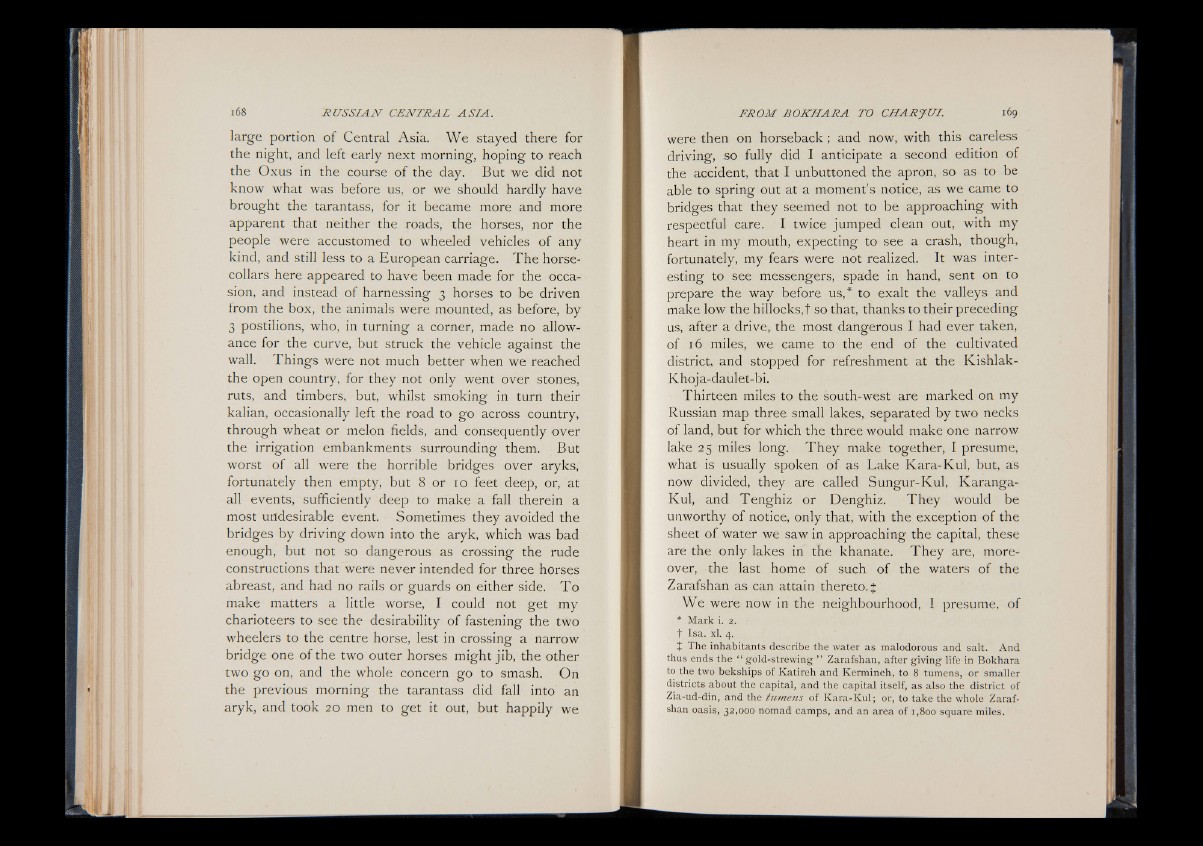
large portion of Central Asia. We stayed there for
the night, and left early next morning, hoping to reach
the Oxus in the course of the day. But we did not
know what was before us, or we should hardly have
brought the tarantass, for it became more and more
apparent that neither the roads, the horses, nor the
people were accustomed to wheeled vehicles of any
kind, and still less to a European carriage. The horse-
collars here appeared to have been made for the occasion,
and instead of harnessing 3 horses to be driven
from the box, the animals were mounted, as before, by
3 postilions, who, in turning a corner, made no allowance
for the curve, but struck the vehicle against the
wall. Things were not much better when we reached
the open country, for they not only went over stones,
ruts, and timbers, but, whilst smoking in turn their
kalian, occasionally left the road to go across country,
through wheat or melon fields, and consequently over
the irrigation embankments surrounding them. But
worst of all were the horrible bridges over aryks,
fortunately then empty, but 8 or 10 feet deep, or, at
all events, sufficiently deep to make a fall therein a
most undesirable event. Sometimes they avoided the
bridges by driving down into the aryk, which was bad
enough, but not so dangerous as crossing the rude
constructions that were never intended for three horses
abreast, and had no rails or guards on either side. T o
make matters a little worse, I could not get my
charioteers to see the desirability of fastening the two
wheelers to the centre horse, lest in crossing a narrow
bridge one of the two outer horses might jib, the other
two go on, and the whole concern go to smash. On
the previous morning the tarantass did fall into an
aryk, and took 20 men to get it out, but happily we
were then on horseback ; and now, with this careless
driving, so fully did I anticipate a second edition of
the accident, that I unbuttoned the apron, so as to be
able to spring out at a moment’s notice, as we came to
bridges that they seemed not to be approaching with
respectful care. I twice jumped clean out, with my
heart in my mouth, expecting to see a crash, though,
fortunately, my fears were not realized. It was interesting
to see messengers, spade in hand, sent on to
prepare the way before us,* to exalt the valleys and
make low the hillocks, t so that, thanks to their preceding
us, after a drive, the most dangerous I had ever taken,
of 16 miles, we came to the end o f the cultivated
district, and stopped for refreshment at the Kishlak-
Khoja-daulet-bi.
Thirteen miles to the south-west are marked on my
Russian map three small lakes, separated by two necks
of land, but for which the three would make one narrow
lake 25 miles long. They make together, I presume,
what is usually spoken of as Lake Kara-Kul, but, as
now divided, they are called Sungur-Kul, Karanga-
Kul, and Tenghiz or Denghiz. T h e y would be
unworthy of notice, only that, with the exception of the
sheet of water we saw in approaching the capital, these
are the only lakes in the khanate. They are, moreover,
the last home of such of the waters of the
Zarafshan as can attain thereto, j
We were now in the neighbourhood, I presume, of
* Mark i. 2.
t Isa. xl. 4.
I The inhabitants describe the water as malodorous and salt. And
thus ends the “ gold-strewing ” Zarafshan, after giving life in Bokhara
to the two bekships of Katireh and Kermineh, to 8 tumens, or smaller
districts about the capital, and the capital itself, as also the district of
Zia-ud-din, and the tumens of Kara-Kul; or, to take the whole Zarafshan
oasis, 32,000 nomad camps, and an area of 1,800 square miles.